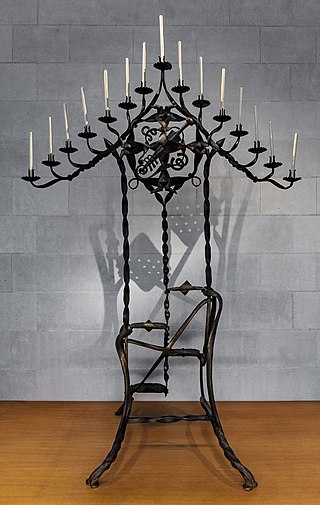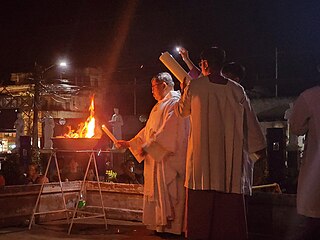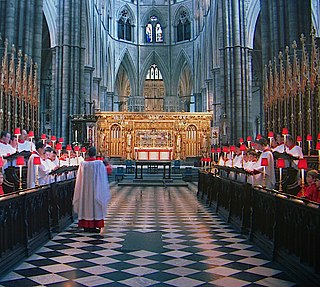
Christmas Eve is the evening or entire day before Christmas Day, the festival commemorating the birth of Jesus. Christmas Day is observed around the world, and Christmas Eve is widely observed as a full or partial holiday in anticipation of Christmas Day. Together, both days are considered one of the most culturally significant celebrations in Christendom and Western society.

In the practice of Christianity, canonical hours mark the divisions of the day in terms of fixed times of prayer at regular intervals. A book of hours, chiefly a breviary, normally contains a version of, or selection from, such prayers.

Holy Saturday, also known as Great and Holy Saturday, Low Saturday, the Great Sabbath, Hallelujah Saturday, Saturday of the Glory, Sábado de Gloria, and Black Saturday or Easter Eve, and called "Joyous Saturday", "the Saturday of Light", and "Mega Sabbatun" among Coptic Christians, is the final day of Holy Week, between Good Friday and Easter Sunday, when Christians prepare for the latter.

Matins is a canonical hour in Christian liturgy, originally sung during the darkness of early morning.

Anglican church music is music that is written for Christian worship in Anglican religious services, forming part of the liturgy. It mostly consists of pieces written to be sung by a church choir, which may sing a cappella or accompanied by an organ.

The observance of Christmas around the world varies by country. The day of Christmas, and in some cases the day before and the day after, are recognized by many national governments and cultures worldwide, including in areas where Christianity is a minority religion. In some non-Christian areas, periods of former colonial rule introduced the celebration ; in others, Christian minorities or foreign cultural influences have led populations to observe the holiday.

Tenebrae is a religious service of Western Christianity held during the three days preceding Easter Day, and characterized by gradual extinguishing of candles, and by a "strepitus" or "loud noise" taking place in total darkness near the end of the service.
Christian liturgy is a pattern for worship used by a Christian congregation or denomination on a regular basis. The term liturgy comes from Greek and means "public work". Within Christianity, liturgies descending from the same region, denomination, or culture are described as ritual families.

The Easter Vigil, also called the Paschal Vigil, the Great Vigil of Easter, or Holy Saturday at the Easter Vigil on the Holy Night of Easter is a liturgy held in traditional Christian churches as the first official celebration of the Resurrection of Jesus. Historically, it is during this liturgy that people are baptized and that adult catechumens are received into full communion with the Church. It is held in the hours of darkness between sunset on Holy Saturday and sunrise on Easter Day – most commonly in the evening of Holy Saturday or midnight – and is the first celebration of Easter, days traditionally being considered to begin at sunset.
Orthros or útrenya in the Byzantine Rite of the Eastern Orthodox Church and the Eastern Catholic Churches, is the last of the four night offices, the other three being vespers, compline, and midnight office. Traditionally, in monasteries it is held daily so as to end immediately following sunrise, in contrast to parishes where it is held only on Sundays and feast days. It is often called matins after the office it most nearly corresponds to in Western Christian churches.

Pasterka is a midnight mass celebrated by Roman Catholics during Christmas between December 24 and 25 across Poland. A close translation of the name would be the "Shepherds' Mass", in reference to the Biblical shepherds, who were visited by an angel and told of the birth of Christ. During the Pasterka Mass, Polish people sing traditional kolędy, Christmas carols in the spirit of joy.

Misa de Gallo is the Midnight Mass celebrated in Spain and many former Spanish colonies on Christmas Eve and sometimes in the days immediately preceding Christmas.

In Christian liturgy, a vigil is, in origin, a religious service held during the night leading to a Sunday or other feastday. The Latin term vigilia, from which the word is derived meant a watch night, not necessarily in a military context, and generally reckoned as a fourth part of the night from sunset to sunrise. The four watches or vigils were of varying length in line with the seasonal variation of the length of the night.

Simbang Gabi is a devotional, nine-day series of Masses attended by Filipino Catholics in anticipation of Christmas. It is similar to the nine dawn Masses leading to Christmas Eve practiced in Puerto Rico called Misa de Aguinaldo. Originally intended as a practical compromise for farmers that started working in the fields before sunrise, this cherished Christmas custom eventually became a distinct feature of Philippine culture and became a symbol of sharing.

St. Thomas's Church, Huron Street is a parish of the Anglican Church of Canada in Toronto, Ontario. One of the earliest Anglo-Catholic congregations in Canada, it was established in 1874, moving twice before settling into its present building, adjacent to the Annex on the western edge of the University of Toronto's downtown campus.

The College of the Resurrection, popularly known as Mirfield, is an Anglo-Catholic theological college of the Church of England in Mirfield, West Yorkshire, England.

A watchnight service is a late-night Christian church service. In many different Christian traditions, such as those of Moravians, Methodists, Catholics, Lutherans, Anglicans, Baptists, Adventists and Reformed Christians, watchnight services are held late on New Year's Eve, which is the seventh day of Christmastide. This provides the opportunity for Christians to review the year that has passed and make confession, and then prepare for the year ahead by praying and resolving. The services often include singing, praying, exhorting, preaching, and Holy Communion.

In many Western Christian traditions, Midnight Mass is the first liturgy of Christmastide that is celebrated on the night of Christmas Eve, traditionally beginning at midnight when Christmas Eve gives way to Christmas Day. This popular Christmas custom is a jubilant celebration of the mass or service of worship in honour of the Nativity of Jesus; even many of those Christian denominations that do not regularly employ the word mass uniquely use the term "Midnight Mass" for their Christmas Eve liturgy as it includes the celebration of Holy Communion.

Evensong is a church service traditionally held near sunset focused on singing psalms and other biblical canticles. It is loosely based on the canonical hours of vespers and compline. Old English speakers translated the Latin word vesperas as æfensang, which became 'evensong' in modern English. Typically used in reference to the Anglican daily office's evening liturgy, it can also refer to the pre-Reformation form of vespers or services of evening prayer from other denominations, particularly within the Anglican Use of the Catholic Church.
The Daily Office is a term used primarily by members of the Episcopal Church. In Anglican churches, the traditional canonical hours of daily services include Morning Prayer and Evening Prayer, usually following the Book of Common Prayer. As in other Christian traditions, either clergy or laity can lead the daily office. Most Anglican clergy are required to pray Morning and Evening Prayer daily.

















